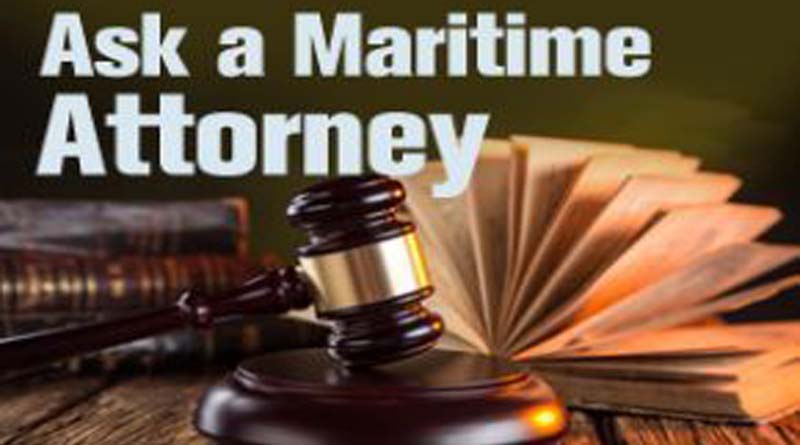Ask a Maritime Attorney: Can I fight my insurance company about a denied claim?
Question:
We own a large motor yacht, and we almost lost her last year when the propeller shaft broke in half during a voyage to Mexico. The boat would have sunk like a rock if the rudder had not stopped the broken end of the shaft from falling out of the back of the boat. We were over 150 miles offshore at the time and we feel very lucky to be here today. Unfortunately, our luck ran out when we returned to port and started dealing with our insurance company. The cost for the repair, including the invoice from the tugboat company for the tow into San Diego, will exceed $100,000. My insurance company has taken the position that the shaft failed due to “wear and tear,” and that the claim is therefore not covered by my policy. What can we do to fight their decision?
Answer
When a marine insurance company is presented with a claim, they have a right to investigate the claim and to hire experts to determine the cause of a loss.
Marine insurance claims often involve a very technical and complicated forensic investigation into the cause of the loss, and these investigations are conducted by experts from a wide range of technical fields. These experts often provide the basis for a claim denial.
In the case described by our reader, the insurance adjuster probably retained a metallurgist or mechanical engineer to inspect the broken shaft, and then relied upon the expert’s opinion to determine that the shaft had failed due to “wear and tear.” Nothing lasts forever, and even a stainless steel propeller shaft can wear out over time, particularly if there is rust or corrosion on the shaft.
Nonetheless, there are steps that a boat owner can take to be sure that he or she is treated fairly. When an expert is hired by an insurance company to investigate a large claim, it is usually advisable for the insured party to retain their own expert to participate in the investigation. For a marine insurance claim, this usually means hiring a marine surveyor who is experienced in litigation and insurance investigation. An attorney may not be necessary during the early stages of an investigation, but an experienced maritime attorney will be a good resource for a referral to a qualified surveyor.
Your surveyor will participate actively in the insurance investigation, and in some circumstances, he may recommend that the owner retain a second expert if the scientific investigation is required.
For the claim described above by the reader, the surveyor would probably refer the boat owner to a metallurgist or engineer who is qualified to review and comment on the findings of the insurance company’s expert.
The insurance company’s expert will render an opinion as to the cause of the loss, and the insurance adjusters will determine whether those findings fall within the coverage of the insurance policy.
In the end, the opinions of the boat owner’s experts may confirm the findings of the insurance company, or they may provide support for possible litigation against the insurance company for wrongful denial of coverage.
In either case, this is money well spent. It may be possible to recover part of the loss even if the boat owner’s experts agree with the findings of the insurance company’s experts.
For example, the expenses associated with returning to port after a casualty may be recoverable under a principle known as the “sue and labor clause,” even if the claim for the loss itself is ultimately denied.
This “clause” is not actually spelled out in most insurance policies, but it is nonetheless imposed as a mutual duty upon both the boat owner and the insurance company.
In short, it requires the boat owner to take all reasonable steps to protect the boat from further damage after a casualty, and it requires the insurance company to reimburse the boat owner for those actions.
In the case described above by the reader, the tugboat fees for towing the boat to San Diego will probably be covered under this provision since the boat had to return to port to prevent further damage.
Marine insurance is a complicated subject that involves technical questions of both fact and law. Boat owners are well-advised to hire their own maritime and legal professionals to deal with their insurance company.
David Weil is licensed to practice law in the state of California and as such, some of the information provided in this column may not be applicable in a jurisdiction outside of California. Please note also that no two legal situations are alike, and it is impossible to provide accurate legal advice without knowing all the facts of a particular situation. Therefore, the information provided in this column should not be regarded as individual legal advice, and readers should not act upon this information without seeking the opinion of an attorney in their home state.
David Weil is the managing attorney at Weil & Associates (www.weilmaritime.com) in Seal Beach. He is certified as a Specialist in Admiralty and Maritime Law by the State Bar of California Board of Legal Specialization and a “Proctor in Admiralty” Member of the Maritime Law Association of the United States, an adjunct professor of Admiralty Law, and former legal counsel to the California Yacht Brokers Association. If you have a maritime law question for Weil, he can be contacted at 562-799-5508, through his website at www.weilmaritime.com, or via email at dweil@weilmaritime.com.


